The Fool
To be an artist is to be a perpetual beginner. Each thing you make has its own logic, an entire language you must learn and navigate. When it’s done, you have to learn a new language all over again.
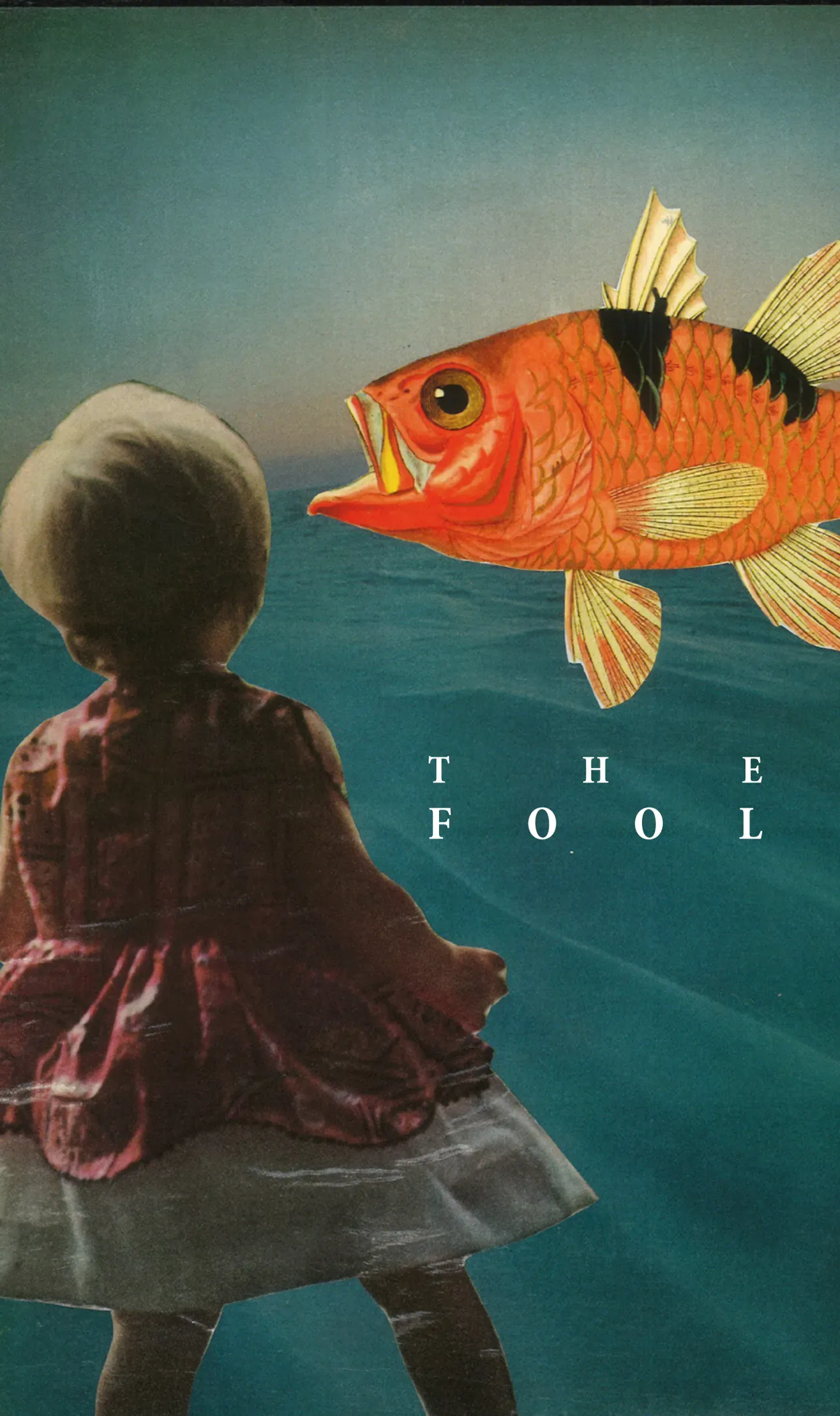
Beginner’s mind, leap and the net will appear, innocence, adventure, travel, naiveté, childlike wonder, beginnings
It doesn’t get better. I always think it will, but beginnings are always the same. The terror of the blank page. I’m paralyzed. Not only do I not know how to write, I’ve somehow never known. Everything I’ve ever written up until this moment was a fluke, an accident, the result of some kind of temporary psychosis or a nefarious wizard’s spell.

Recently, I opened one of the seven hundred notebooks I keep simultaneously, and read a list of questions I had written to myself in a bout of panic over an empty page. Here are the questions:
- What is a creative life? Why does it matter?
- Why do we make art and who do we do it for?
- What is the point of any of this?
- Why doesn’t my brain work? Why am I so averse to boredom? Why can’t I regulate my emotions? Why can’t I write?
- What is the story I think I’m telling? How can I make sure that that is definitely not the story I am telling?
- What if I never write another word again?
- What do I think I’m going to get from my phone? What has the internet ever done except make me feel terrible?
- Why am I so determined to blame my circumstances on someone else?
- What do I even want to say?
- What do I think is worth celebrating in this shit-ass world? What the fuck is even worth saving? (Author’s note: I take anti-depressants for a reason)
- How am I screwing up my kids?
- How am I abdicating my responsibilities?
- Is typing the problem? Do I need to become one of those assholes who writes long hand?
- If I find the right font will I feel like a real writer?
- Am I burned out or profoundly lazy?
- Do I even have a single other skill?
- Is the best thing I will ever write already behind me?
I have always envied people who love to write, who romanticize and even enjoy the process. I've only known a few professional writers who will say that they enjoy the process of writing (my friend and one of the most prolific people I know, Emily St. James, is one of them, and I harangue her about it every chance I get). Generally, actors are the only people who enjoy writing, because they approach it like they are stepping into the role of "The Writer": “I love writing,” they say, “I wear my cowl neck sweater, I sit by an open window to catch the light breeze, I’ve got a cozy blanket on my lap, a cup of steaming hot tea, jazz plays from my record player, and the words just flow.”
This is not my process. Picture me in process: braless, hair unbrushed, breath reeking of coffee, jacked up on caffeine and cranky, hungry, bored, and crawling out of my skin. Instagram calls to me. So does the NY Times Games section, and I’m angry now, because I should be better at Spelling Bee but for some reason I suck at it. Instead of writing, I am counting the ways I’ve failed my children, or writing a five hundred point to-do list. Instead of writing, I’m imagining time slipping through an hour glass. Suddenly, there I am on my death bed, an old woman who used to be able to write, but who forgot decades ago, and has instead spent the last forty years watching makeup tutorials on instagram.
My process follows the same pattern without fail:
Step One: Like a burst of lightning, I get an idea, an explosion of manic energy and joy. I have found something beautiful in the recesses of my mind, something that thrills or terrifies me. I can see it glowing there in my head, see it gathering its strength and building an undeniable argument for why it must make its way onto a page. I’m excited, nobody has ever had an idea this good. This idea is genius, it will win an Oscar, it will save the world.
Unfortunately, the only thing that follows a great idea is writing it, and that’s when you learn what a shitty fucking idea it was all along.

Step Two: Begin writing. Hate everything and everyone. Forget everything I’ve ever known about writing. Complain constantly. Daydream about doing something else for a living.
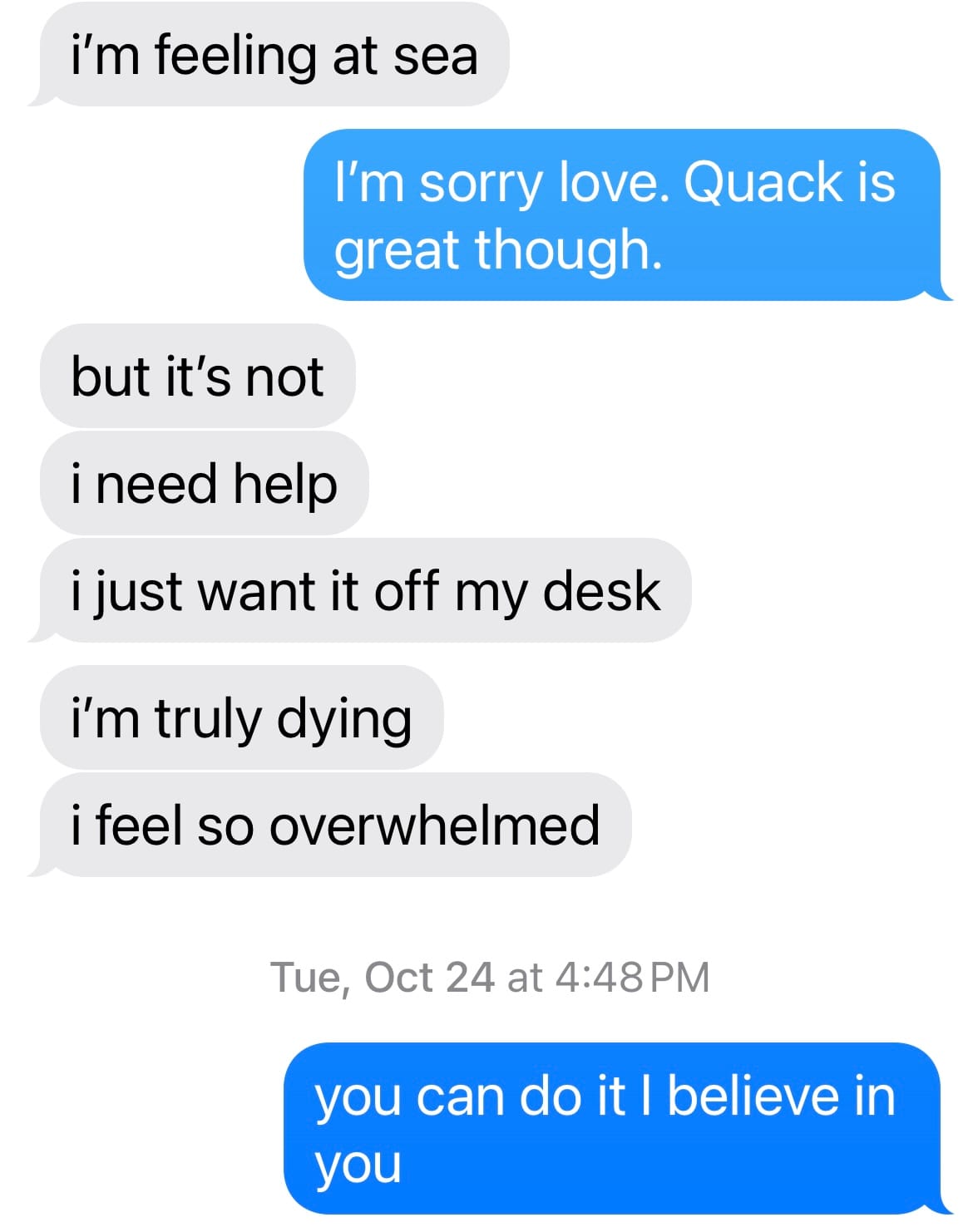
Step Three: Call my husband and tell him I’m quitting. I gave it fifteen years and then some, but I’ve only just come to terms with the fact that I’m a terrible writer and everything my brain comes up with sucks. Whine and protest while he reminds me that he has received this exact same call approximately seventeen times a year for the entire time I’ve known him.

Step Four: Procrastinate while feeling immense shame and guilt about not writing. Clean my entire house. Make a miniature room for a friend. Buy something I neither want nor need. Go to The Container Store. Eat my feelings.
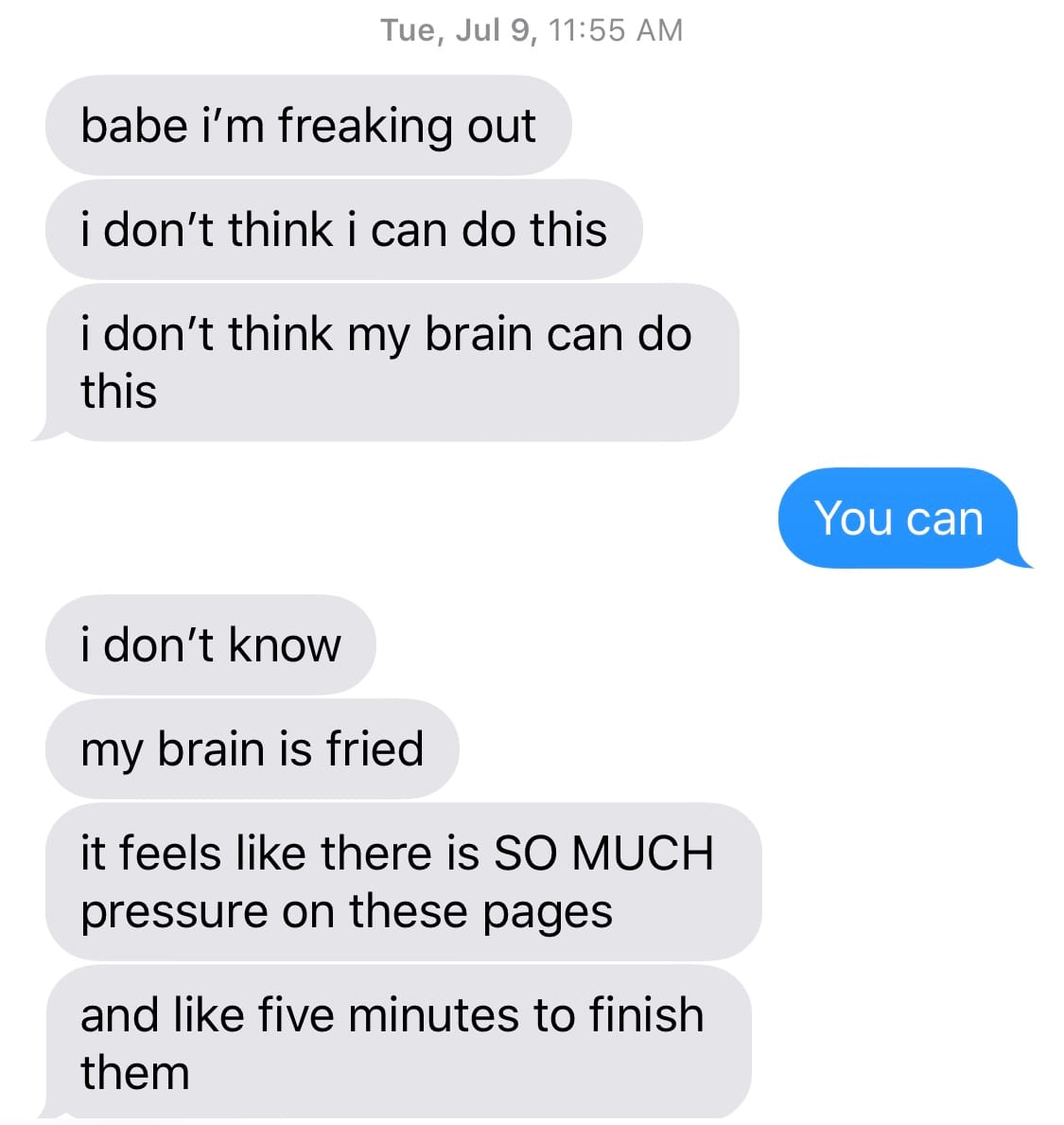
Step Five: Huff and puff my way through a shitty first draft, reminding myself that it will be bad, and that’s fine. I just have to get to the end. After all, this is my job (for now, because any day I’ll quit to become a children’s birthday party planner).

Step Six: Read the shitty draft. Hmmmm… there’s actually a lot of cool stuff in here. Maybe I am a writer after all.
Step Seven: Actually, this is great. It needs work, but it’s great. Call Zack to tell him that I actually think I might have accidentally written something interesting. Laugh when he says, “You do this every single time.” Forget immediately that this is the process. Repeat.
All writing, all creation, requires a leap of faith. You can never know how compelling or worthwhile a story is until you start to write it. That’s what I’ve found time and again, and I’ve begun and discarded a hundred different projects for every single successful piece of writing I’ve finished.
Occasionally an idea will not pan out, or it will sit in a drawer for many years before you rediscover it and think of an entirely new angle. There are ideas I’ve dusted off after a decade and taken in a wildly new direction and ended up loving. But it’s important to note that every once in a while, it’s a swing and a miss.
Not everything can be great.
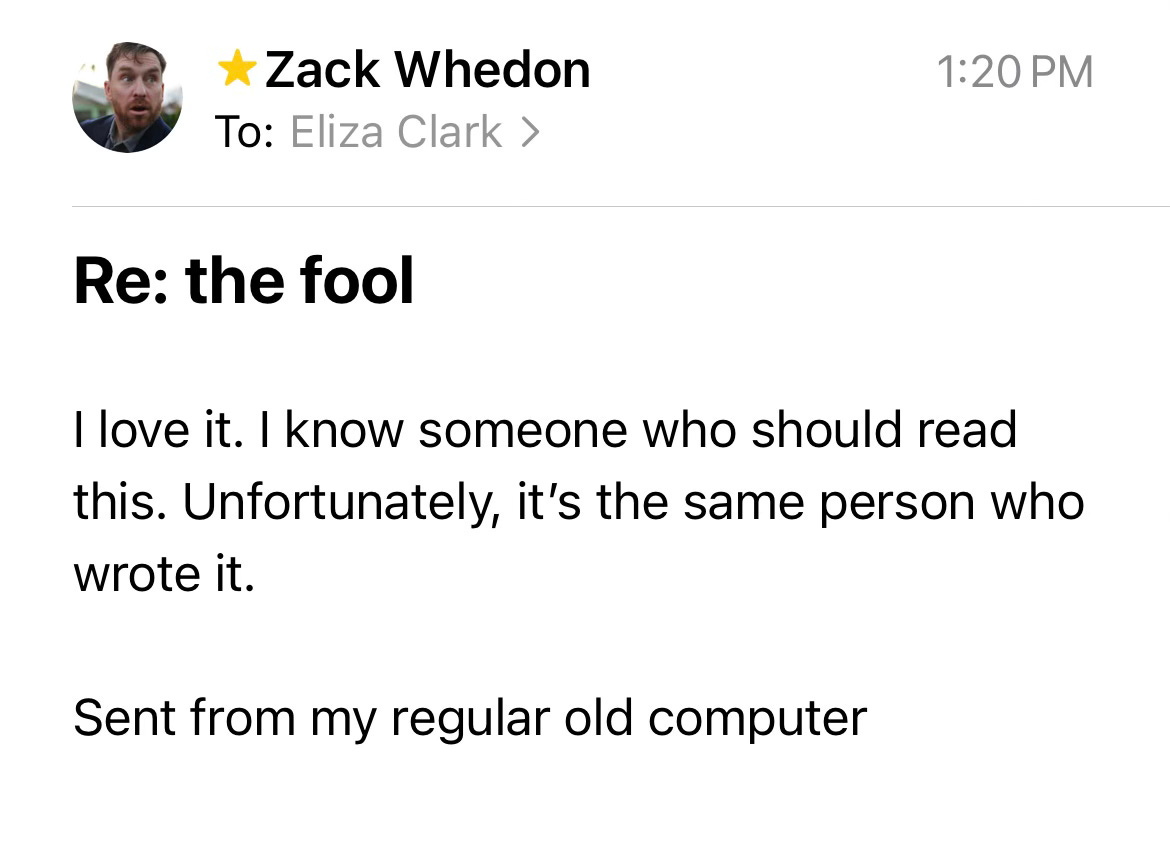
I’m compelled to state that being a professional writer makes it a billion times harder (at least for me) to take that leap of faith. The stakes are higher when the thing you are supposed to love is also what pays for your children’s dental appointments, clothing, school, capoeira, and the roof over their heads. When you’re writing plays in your dorm room in college, it’s a lot easier to think “ooh, what about this?” These days, I have to really discipline myself not to immediately think about Business Daddy and The Market ten seconds after having an idea. Good shit never comes out of thinking about what capitalism wants. Capitalism only cares about sure things, things that have worked before. By design, that pushes professional writers in the direction of old ideas.
Occasionally when I’m really starting to panic, I’ll turn to the words of old masters. Stephen King’s On Writing is a beautiful book, but it’s hard to take advice from someone that prolific. Writing seems to just flow out of his fingertips, and it’s honestly kind of annoying. How does he do it? Does he ever have any doubts? Where do all those fucking ideas come from?
George RR Martin agrees with me.
When I was a senior in college, I wrote the first actually good thing I had ever written. It was a play called Edgewise and I wrote it in about three days for a class taught by the inimitable playwright, Donald Margulies. It felt like I was a channel for this play, rather than its author. I just started writing and the words poured out of me (I’ve been chasing that feeling ever since). I was expressing ideas that scared me (the play is about three teenagers working in a fast food restaurant during an American civil war), and every line I wrote felt dangerous and electric, excavating some fucked up place in my mind, a creative exorcism.
Donald Margulies became a mentor to me, giving me notes, introducing me to his agent, and generally making me feel like writing was something I could do professionally. But he also gave me some of the best and most difficult advice about writing that I’ve ever received. After writing Edgewise, I felt an enormous sense of joy and accomplishment. I had written something good, something that a real writer told me was good, something that got me an agent and jobs in television, something that made multiple television executives tell me I “write like a man” (something I took as a compliment at the time, and only years later do I look back on and think yikes). I wanted to do a victory lap. Finally, after years of secretly suspecting I might be a writer, here I was: a writer.
Donald Margulies’s advice to me was this: “Write the next thing. Don’t spend all your time rewriting the thing you wrote that works. Just write the next thing. That’s the only way to get better.”
It felt like a gut punch at the time. It felt like he was saying, “the next thing you write will be better” which made me feel like he was saying that Edgewise wasn’t that good. But that’s not what he said. What he said was, “keep going.” What he said was: Leap and the net will appear. What he said was: the thing that makes you a writer is writing, not having written.
To be an artist is to be a perpetual beginner. Each thing you make has its own logic, an entire language you must learn and navigate. When it’s done, you have to learn a new language all over again. You have to be Indiana Jones on the edge of a crevasse, afraid to take the next step, but unwilling to turn back.
Every piece of art is a leap of faith. Being a beginner is nothing to be afraid of. In fact, it’s the only thing that affords you the curiosity and wonder to try something new.
The Fool knows this. When he comes up for you in a Tarot spread, he's reminding you to look at the world through fresh eyes, unburdened by knowledge. You're on the precipice of something. The only thing left to do is leap.
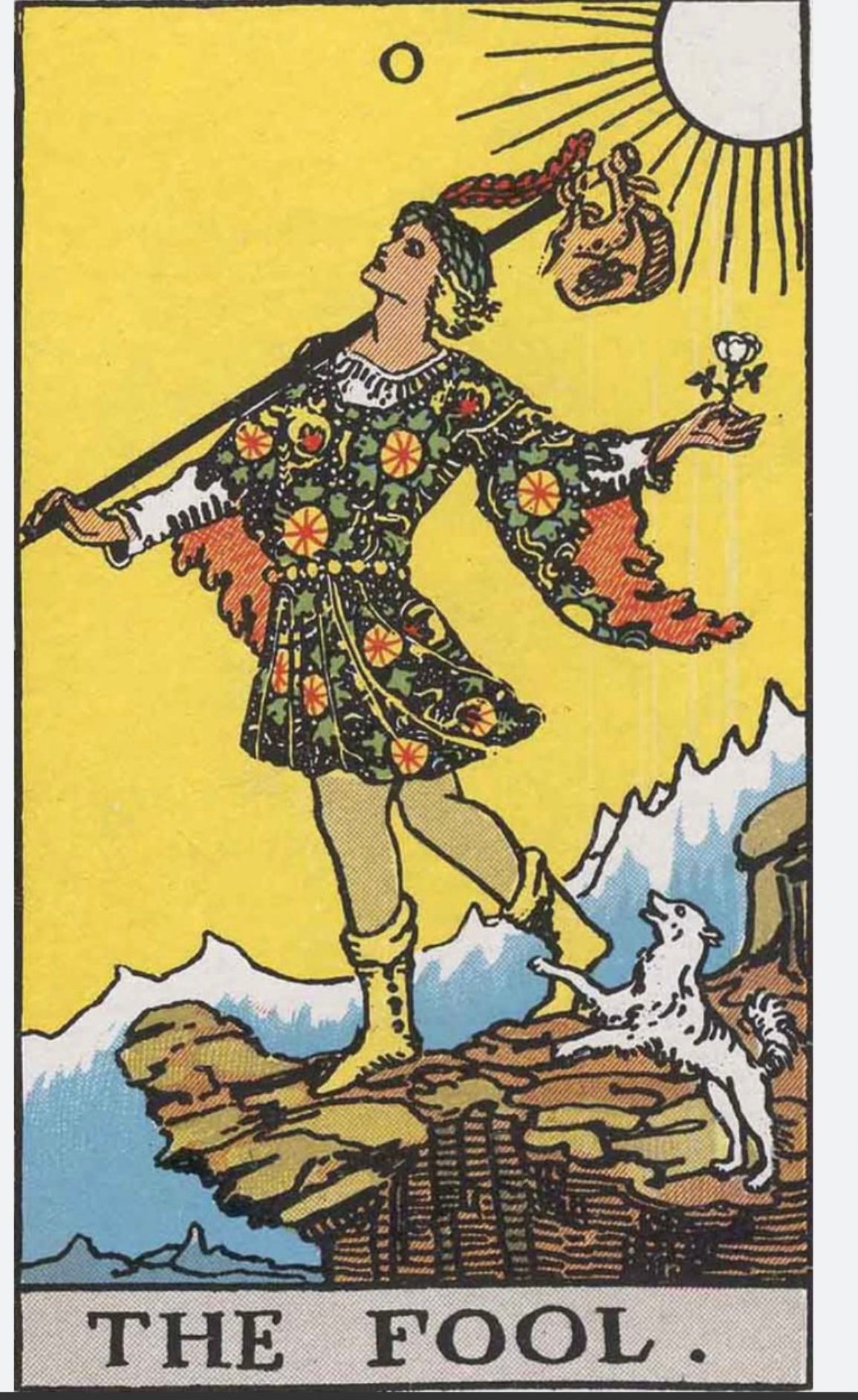
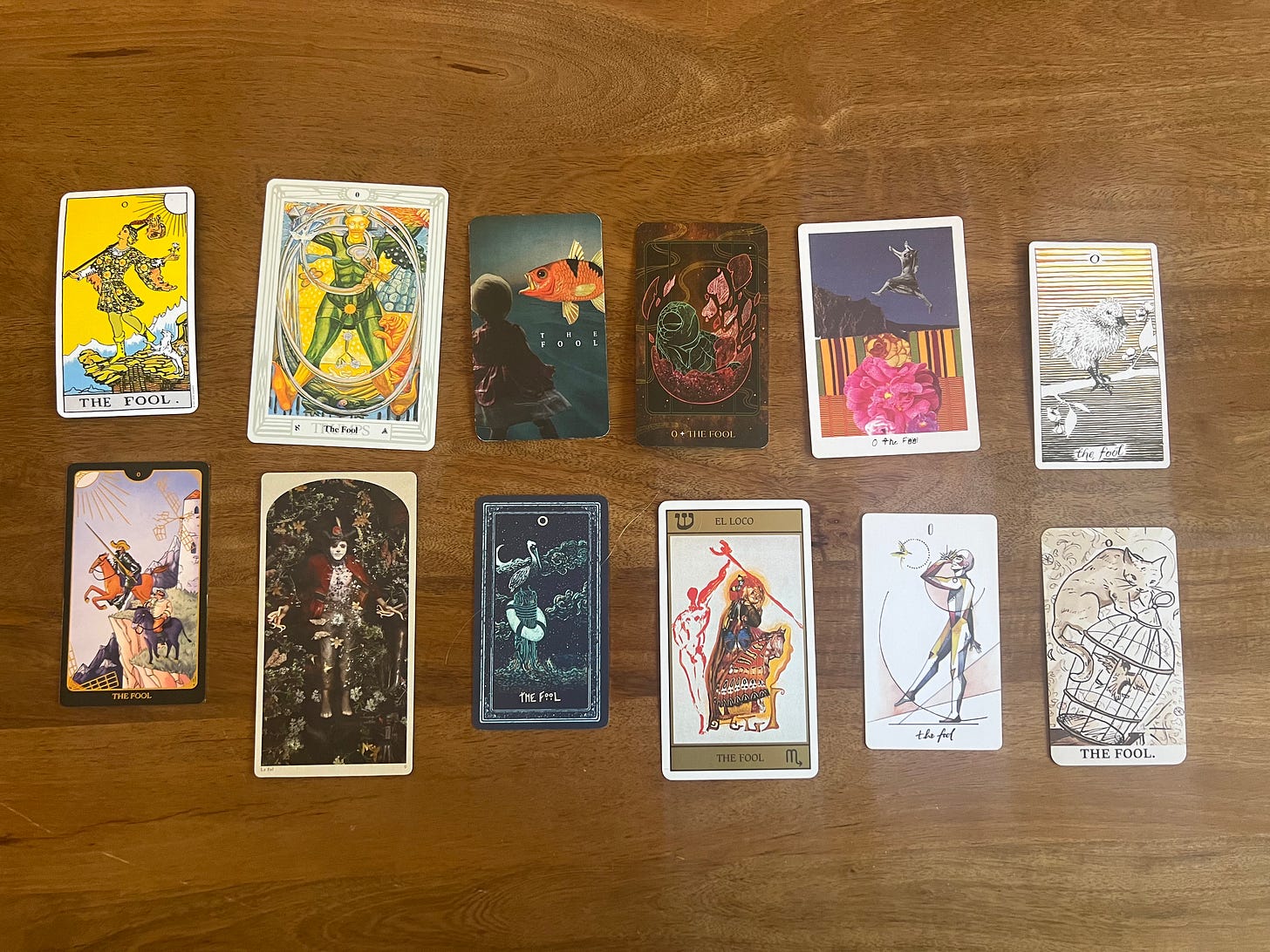
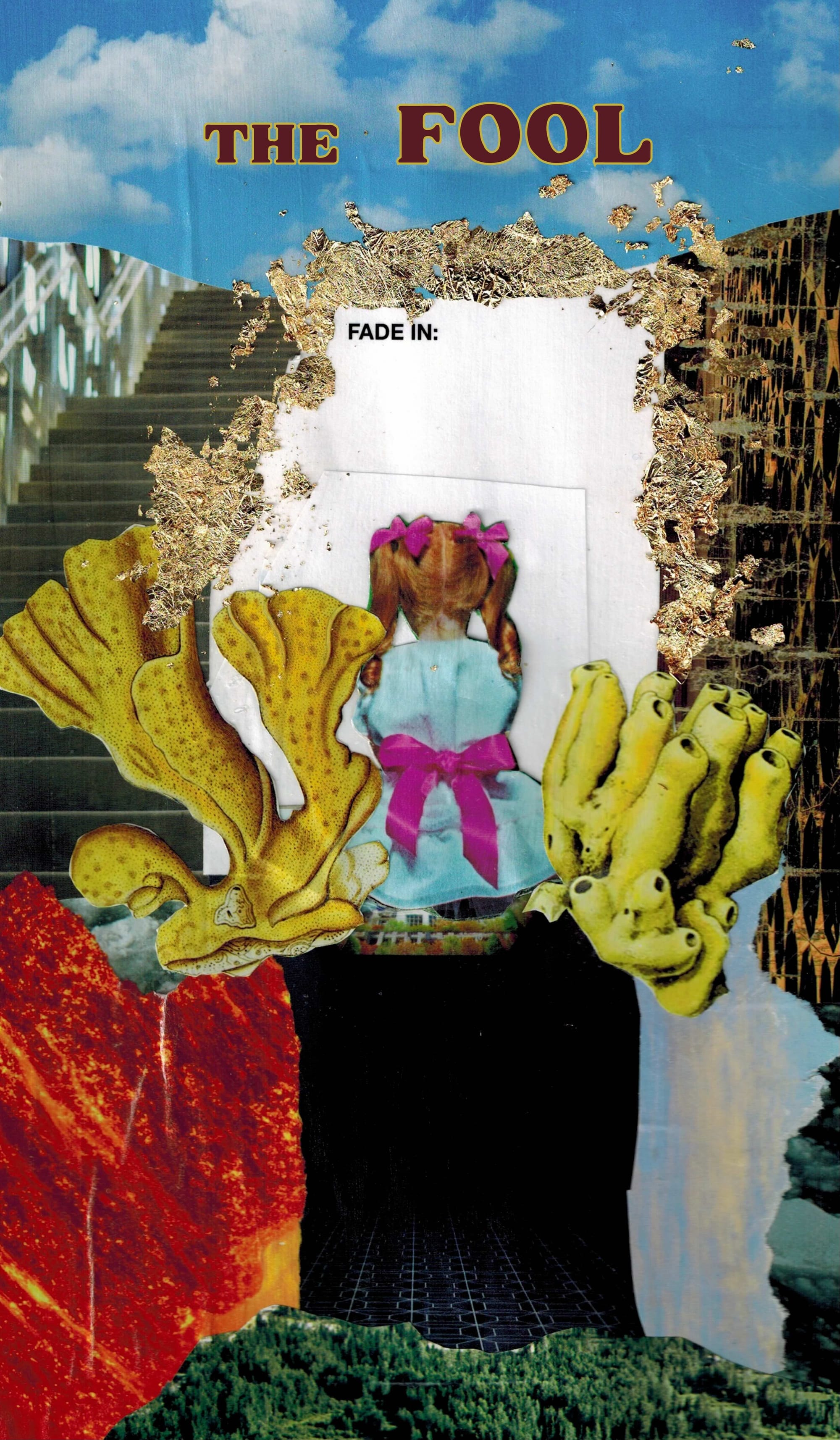
A few recommendations while I’m at it:
I recently read a beautiful book called Forager: Field Notes for Surviving a Family Cult by Michelle Dowd. This beautifully written memoir captures the essence of The Fool. Told from the perspective of a gifted little girl raised under extraordinary circumstances, this is a book about learning how to learn, trusting your intuition, and finding beauty and your true north in spite of trauma and fear.
If you are a writer, an aspiring writer, or just a human who’s trying to get through the day in these unprecedented times, you’ll love Never Say You Can’t Survive: How To Get Through Hard Times By Making Up Stories by my friend and genius writer Charlie Jane Anders. This book is an inspiring and joyful manifesto about creativity, and a life-affirming reminder that stories can help us get through anything.
And, as promised, a playlist I made to capture the clean slate, beginner’s mind spirit of The Fool:
Subscribe so you won’t miss out on next week’s deep dive into The Magician…
